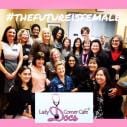Written by Thu Tran, MD,FACOG
December 26, 2018
Are you alone at this time of the year, or do you plan to spend time with your family and friends? Do you know of the loners in your neighborhood or your work places? If you have, like me, many holiday gatherings to go to, count yourself very lucky. You might complain how you do not have enough time to “relax,” with all the running around getting gifts for family members or cooking for the next holiday party. Count yourself lucky that you are not among the astounding statistics of lonely people in the United States.
There are 8 million people at 50 years and older who do not have close relatives, such as spouses or children. A study by Harvard, Stanford and AARP showed how the lack of a social network has cost Medicare $6.7 billion a year in nursing facilities and hospitalizations. These people have no close social network to care for them at home! College educated women and individuals with low income were found to be more likely to be alone.
Using the “Loneliness Scale” of the University of California Los Angeles, a recent survey of 20,000 U S. adults resulted in nearly half reporting feelings of loneliness. A Cigna report showed only 53% Americans believe they have meaningful daily face-to-face social interactions, while Generation Z (18 to 22 years old) claimed they were the most lonely generation. Social media alone does not predict loneliness, as heavy users score on the Loneliness Score only a little higher than those who never used social media.
Loneliness carries terrible medical consequences. A study released last August by the American Psychological Association showed how lonely people are at higher risk for premature deaths. Loneliness was found to be equivalent to smoking 15 cigarettes or consuming 6 alcohol drinks daily. Loneliness was considered worse than being obese or inactive.
Recently, a 75-year study from Harvard revealed the secret to a happy life. This study, called the Grant and Glueck study, followed 456 poor men in Boston from 1934-2014 (the Grant study) and 268 male Harvard graduates from the classes of 1939-1944 (the Glueck study).
Many of us would not be surprised that the researchers of this study found the most important factor to having a fulfilling life is happy relationships. While love was found to be hte most important factor in one’s happiness, power or money were not found to be important at all in this scheme of joy. It is, however, the quality of love or relationships, not how many friends or acquaintances one has that counts. The researchers concluded that to achieve longevity and happiness, people should work on maintaining good relationships.
A 2012 study from the University of California, San Francisco, again, stressed the importance of quality relationships, showing how 43% of the study subjects reported feeling lonely while only 18% of them actually lived alone.
It is important to keep the above studies in mind as we get older. We should work on our meaningful relationships. We also should reach out to those with limited social ties and try to bring them into our own networks. It is worth it to build a happy community where people can lean on each other as they get older. The family units in the United States have been getting smaller over time, with many adults having no children or only one child. Unless their communities are full of close knit friends, they might face their aging years alone and lonely.
Many colleagues and I have been fortunate to have found each other. Our social network has allowed us to exercise together, hold bookclubs with meaningful discussions, participate in medical missions or community services, consulting with each other’s expertise in difficult medical cases. We have leaned on each other during the hard times in our families or our country. We hope you are able to build such communities of friends and families wherever you may be. Our journey through this world is more meaningful and joyful if we include others along the way, instead of building a wall to isolate ourselves.
Tags:










